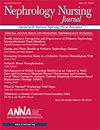Patient Education 101.
IF 0.8
4区 医学
Q4 NURSING
Nephrology Nursing Journal
Pub Date : 2025-03-01
引用次数: 0
Abstract
Patient education is a professional responsibility of all registered nurses (RNs); however, many RNs have never been taught how to teach, and specifically, how to teach patients. Teaching is a specialty all its own, and requires knowledge of principles and practices of teaching. This article provides basic information for RNs who are providing patient education, including learning theories and styles, learning environments, teaching strategies (communication, teach-back, microlearning, feedback, debriefing and reflective practice, educational materials), patient assessment (motivational interviewing, health literacy), planning (goals and objectives), competency, implementation, and evaluation.
病人教育101。
患者教育是所有注册护士(RNs)的职业责任;然而,许多注册护士从来没有被教过如何教书,特别是如何教病人。教学本身就是一门专业,需要对教学原理和教学实践有一定的了解。本文为提供患者教育的注册护士提供了基本信息,包括学习理论和风格、学习环境、教学策略(沟通、反教、微学习、反馈、述职和反思实践、教材)、患者评估(动机访谈、健康素养)、计划(目标和目的)、能力、实施和评估。
本文章由计算机程序翻译,如有差异,请以英文原文为准。
求助全文
约1分钟内获得全文
求助全文
来源期刊

Nephrology Nursing Journal
Medicine-General Medicine
CiteScore
0.70
自引率
22.20%
发文量
67
期刊介绍:
The Nephrology Nursing Journal is a refereed clinical and scientific resource that provides current information on wide variety of subjects to facilitate the practice of professional nephrology nursing. Its purpose is to disseminate information on the latest advances in research, practice, and education to nephrology nurses to positively influence the quality of care they provide.
The Nephrology Nursing Journal is designed to meet the educational and information needs of nephrology nurses in a variety of roles at all levels of practice. It also serves as a source for nonnephrology nurses. Its content expands the knowledge base for nephrology nurses, stimulates professional growth, guides research-based practice, presents new technological developments, and provides a forum for review of critical issues promoting the advancement of nephrology nursing practice.
 求助内容:
求助内容: 应助结果提醒方式:
应助结果提醒方式:


